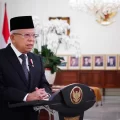NEW YORK, 28 SEPTEMBER 2015
Your Excellency President Barack Obama,
Excellencies,
Distinguished Delegates,
Allow me to begin by extending my appreciation to you, Mr. President, for taking the initiative in convening this important Summit to assist and support peace and security in all parts of the globe.
More than 100,000 UN peacekeepers are currently deployed in some of the world’s most dangerous places – performing ever complex and multidimensional mandates.
Surely you would agree with me that the all-time high demand for UN peacekeeping continues.
The demand does not only outpace the UN’s capacity to respond to crises around the world, but also drains the pool of personnel and capabilities contributed by member states.
Against this backdrop, Indonesia continues to do its part. Indonesia is mandated by the Preamble to the 1945 Constitution to play an active role in promoting world peace and order. Since the early days of our independence Indonesia has contibuted to and continued to support the UN peace keeping missions in various conflict zones throughout the globe, starting in Sinai in 1957 and Congo in 1960.
As a follow up of the last Peace Keeping Summit, we hosted the Asia-Pacific Regional Meeting on Peacekeeping in Jakarta last July.
I am proud to say that the Meeting was able to serve its purpose.
A number of important issues were raised at the Jakarta Meeting, as can be seen from the summary that has just been circulated here, among others:
First, It addressed the challenges of increasingly complex mission environments and key issues of common concerns in contributing to UN peacekeeping.
Second, a call was made for the UN to provide clarity with regard to missions’ mandates, particularly on the clear distinction between peacekeeping and peace-enforcement.
Third, there is a need to foster triangular consultations between the Security Council, the DPKO[1] and contributing countries during all stages of mandates-formulating.
More importantly, the Jakarta Meeting also heard encouraging announcement on possible future contributions to UN peacekeeping.
Excellencies,
Distinguished delegates,
At this opportune time, I wish to announce Indonesia’s pledges of future contributions for UN peacekeeping.
Currently, we are deploying 2.730 troop and police personnel in 9 missions.
Indonesia remains steadfastly committed to realizing our vision of 4,000 peacekeepers by the year 2019. Towards this end we have recently established a security and peacekeeping center to train prospective peacekeepers. The Center also welcomes participants from other friendly countries.
Early this year, we finalized the deployment of a 800-personnel strong Composite Battalion to UNAMID[2].
We are now at the final stage to deploy three utility helicopters Mi-17 to MINUSMA[3].
By 2016, we are ready to deploy a military composite battalion and a formed police unit.
This includes 100 individual police officers, in which 40 of them are female police officers.
Increasing of our civilian capacity to serve at the UN missions is also part of our roadmap.
Mr. President,
Excellencies,
Distinguished delegates,
This year, we celebrate the 70th anniversary of the foundation of the UN.
We are cognizant that fulfilling its mandate remains a challenge.
Each country may contribute differently to UN peacekeeping.
And, even the smallest contributions matter. They can make a difference in maintaining international peace and security.
First and foremost, deploying UN peacekeeping mission is a reflection of international commitment to maintaining peace and stability, which can only be built on close international cooperation. In the face of the current threats to international security we must work hard to enhance international cooperation and mutual trust between countries.
In the final analyses, however, conflict prevention is clearly the best way forward. Rather than having to deploy large numbers of soldiers and police officers as UN peacekeepers, we should work harder to prevent inter-state conflicts from happening. Internally, states can prevent conflicts and the rise of radicalism among others by ensuring social justice, a more equitable economic development, an inclusive and participatory political process and good governance.
Thank you.
[1] Department of Peacekeeping Operations
[2] African Union/ UN Hybrid Operations in Darfour
[3] UN Multidimensional Integrated Stabilization Mission in Mali


